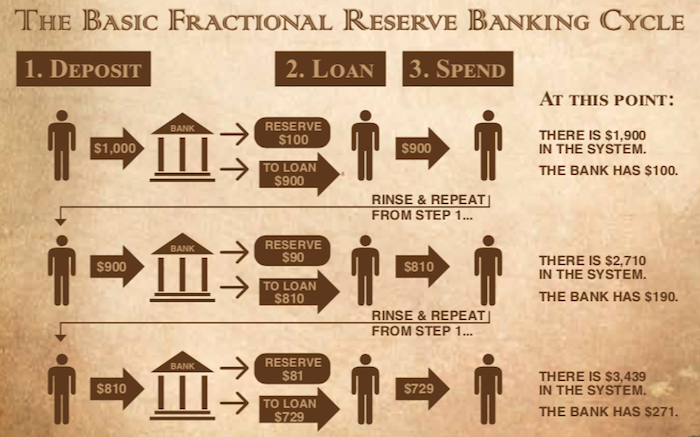Part Two: The Biblical Practice of Government
Chapter 8: Biblically Assessing Economic Issues
In determining the Biblical role of a civil government in economic affairs, it is useful to begin with the Biblical purposes of civil government in general: (1) to facilitate the peace and quiet of society; (2) to secure the rights and rewards of those who follow God’s laws; and (3) to punish evil. Focusing these purposes on economic issues, a government’s policies should be such as to maximize the well-being of its people (Romans 13:4) through the prospering of those who do “good work” and the punishment of those who commit evil. This creates the optimal conditions for man to fulfill his God-given responsibilities (Genesis 1:28; Genesis 9:6-7).
Private Property
 God’s Ideas. Psalm 24:1 makes it clear that all property ultimately belongs
to God: “The earth is the Lord’s, and the fulness thereof; the world, and they
that dwell therein.” However, He gave man dominion over His creation so that he
could fulfill his divinely given responsibilities (Genesis 1:26-30). This was
not merely dominion in a general sense but included legally protected private
property ownership (Exodus 20:15, 17). The Scriptures make clear that God’s
design for civil government is to protect property rights, not infringe upon
them in order to accomplish its own devices (1 Samuel 8; 1 Kings 21:1-29). Some
claim that, due to the example set by the early Christians (Acts 4:32-37), there
is no longer Scriptural support for private property rights and that God’s new
design is for society to live communally. However, this passage makes it clear
that they still possessed their private property and voluntarily gave as they
were able to meet the needs of others in their community of believers. There was
no force and therefore no socialism. God’s design is that individuals possess
and manage their own property responsibly—part of which includes giving of it
generously to meet the needs of others.
God’s Ideas. Psalm 24:1 makes it clear that all property ultimately belongs
to God: “The earth is the Lord’s, and the fulness thereof; the world, and they
that dwell therein.” However, He gave man dominion over His creation so that he
could fulfill his divinely given responsibilities (Genesis 1:26-30). This was
not merely dominion in a general sense but included legally protected private
property ownership (Exodus 20:15, 17). The Scriptures make clear that God’s
design for civil government is to protect property rights, not infringe upon
them in order to accomplish its own devices (1 Samuel 8; 1 Kings 21:1-29). Some
claim that, due to the example set by the early Christians (Acts 4:32-37), there
is no longer Scriptural support for private property rights and that God’s new
design is for society to live communally. However, this passage makes it clear
that they still possessed their private property and voluntarily gave as they
were able to meet the needs of others in their community of believers. There was
no force and therefore no socialism. God’s design is that individuals possess
and manage their own property responsibly—part of which includes giving of it
generously to meet the needs of others.
Satan’s Perversions. Satan seeks to destroy private property rights through tyrannical governments. Karl Marx wrote in his Communist Manifesto that “the theory of the Communists may be summed up in the single sentence: abolition of private property.”[53] 53. “Chapter II: Proletarians and Communists,” Manifesto of the Communist Party, https://www.marxists.org/archive/marx/works/1848/communist-manifesto/ch02.htm. Political philosopher Ayn Rand wrote, “Socialism is the doctrine that man has no right to exist for his own sake, that his life and his work do not belong to him, but belong to society, that the only justification of his existence is his service to society, and that society may dispose of him in any way it pleases for the sake of whatever it deems to be its own tribal, collective good.”[54] 54. “Socialism,” Ayn Rand Lexicon, http://aynrandlexicon.com/lexicon/socialism.html. If Satan can force man to live and work solely for the sake of the tyrannical state, he can therefore destroy man’s ability to fully follow Christ’s commands and purpose.
Why It Matters. Private property rights are necessary for us to be able to serve God to the full extent that He intended for us (Genesis 1:26-30). Without them, the rest of our God-given rights are threatened. John Adams observed this when he said, “Property must be secured, or liberty cannot exist.”[55] 55. Paragon Foundation, http://paragonfoundation.org/pf-resources.html Reverend John Witherspoon made the connection between economic freedom and spiritual freedom when he commented, “There is not a single instance in history in which civil liberty was lost, and religious liberty preserved entire. If therefore we yield up our temporal property, we at the same time deliver the conscience into bondage.”[56] 56. “Religious Liberty: The American Experiment,” Bill of Rights Institute, http://billofrightsinstitute.org/religiousliberty/.
Money
God’s Ideas. The Bible makes it clear that deceptively manipulating/changing the value of an item of trade (including money) is abominable to God (Leviticus 19:35-36; Proverbs 20:10, 23). It also likens diluting the value of money (silver) to the diluting of a society’s morality (Isaiah 1:22). From these passages we can conclude that God’s design is that governments refrain from inflating their currencies as a short-term remedy for deficits since this practice defrauds the citizens by paying them for their goods and services with money that is actually worth less than advertised. It is a lie enforced as if it were truth.
Satan’s Perversions. In today’s economy, the most prevalent methods of enforcing this lie are through quantitative easing and fractional reserve banking. Quantitative easing is the practice central banks often use to lower interest rates and increase the money supply by providing financial institutions with large amounts of additional capital in an attempt to increase economic activity. Fractional reserve banking is a banking system in which a bank keeps only a fraction of its deposits backed by cash-on-hand and loans out the rest. This system effectively creates new money because the money that is loaned out is not directly tied to a corresponding amount of deposited money. When these two practices are combined, the money supply rapidly increases, leading to inflation. Though this practice is heralded by many economists today as fostering economic growth, especially during periods of recession, it actually makes our problems worse by rewarding poor banking practices. This leads to malinvestment and misallocation of capital, resulting in economic bubbles and the boom-bust cycle.[57] 57. For a more detailed discussion, read Economic Depressions: Their Cause and Cure by Murray Rothbard. More importantly, these practices are immoral because they result in a dishonest inflationary tax, are a form of counterfeiting, unjustly favor a few at the expense of the many, are done in secrecy and by force, violate our right to property (inflation reduces the value of our savings), promote the philosophy of instant gratification (easy credit and low interest rates encourage spending rather than saving), encourage corruption in politics (the ability of a government’s central bank to give money away to specific organizations encourages the practice of bribing politicians), hurt savers and those on fixed incomes (including retirees), and violate the Constitution (which gives no authority for the creation of a central bank, much less the creation of fiat currency).

Why It Matters. The Founding Fathers realized that the issue of money is extremely important to the well-being of any society. John Quincy Adams stated:
All the perplexities, confusions, and distresses in America arise, not from defects in the Constitution or confederation, not from want of honor or virtue, as much as from downright ignorance of the nature of coin, credit, and circulation.[58] 58. David Draughon, Financial Armageddon: The Corruption of Our Currency, (Cedar Fort, 2007), 53.
George Washington advised, “We should avoid … the depreciation of our currency; but I conceive this end would be answered, as far as might be necessary, by stipulating that all money payments should be made in gold and silver, being the common medium of commerce among nations.”[59] 59. http://www.freerepublic.com/focus/news/3225192/replies?c=9. German banker Mayer Rothschild succinctly stated the incredible power of money over society when he announced, “Permit me to issue and control the money of a nation and I care not who makes its laws.”[60] 60. “It’s About the Money,” The Trashing of America, http://www.jeremiahproject.com/trashingamerica/money.html.

Lenin, always looking for methods to advance communism, observed that the best way to destroy the capitalist system is to debauch the currency. By a continuing process of inflation, governments can confiscate, secretly and unobserved, an important part of the wealth of their citizens. There is no subtler, no surer means of overturning the existing basis of society than to debauch the currency.
Debt
 God’s Ideas. “Owe no man any thing, but to love one another.” (Romans
13:8). God’s Word makes it clear that debt is something that is to be avoided
because it can lead to bondage (Proverbs 22:7) and excessive debt is a mark of
wickedness (Psalm 37:21). National debt is also a sign of a nation that is
suffering and experiencing God’s judgment (Deuteronomy 28:43-44).
God’s Ideas. “Owe no man any thing, but to love one another.” (Romans
13:8). God’s Word makes it clear that debt is something that is to be avoided
because it can lead to bondage (Proverbs 22:7) and excessive debt is a mark of
wickedness (Psalm 37:21). National debt is also a sign of a nation that is
suffering and experiencing God’s judgment (Deuteronomy 28:43-44).
Satan’s Perversions. Many politicians today claim that government deficit spending is an effective and necessary means of stimulating the economy during periods of recession and high unemployment. They point to the thousands of jobs “created” by civil works projects, expanding the size of the military, or adding a new federal department or agency funded by deficit spending. When pressed to cut spending in order to balance the budget, they claim that unemployment would soar and a recession would set in as a result of all of those government employees being laid off. However, what they fail to realize is that economic growth financed by deficit spending is unsustainable since the debt accrued will only grow with time and the interest rates will increase, forcing the government to either cut spending by an even greater amount in the future or raise taxes. Furthermore, they fail to consider Bastiat’s principle of “what is seen and what is not seen”—that government spending is always going to be less efficient and productive than if it is done by private actors who are driven by the profit motive, so the economy would be better off if governments simply lowered taxes rather than spending more money on stimulus projects.[61] 61. For a more detailed discussion, read Economics in One Lesson by Henry Hazlitt and That Which Is Seen, and That Which Is Not Seen by C. F. Bastiat.
Why It Matters. Just as the Scriptures say, accruing large public debts can enslave a nation to foreigners and force us to do their bidding. Additionally, making large interest payments can lead to higher taxes, which drag down the economy. Benjamin Franklin wrote, “Think what you do when you run in debt; you give to another the power over your liberty”[62] 62. Steve Rhode, “The History of Credit and Debt – Benjamin Franklin,” Get Out of Debt Guy,https://getoutofdebt.org/14414/the-history-of-credit-debt-benjamin-franklin. ; and Thomas Jefferson asserted, “I, however, place economy among the first and most important of republican virtues, and public debt as the greatest of the dangers to be feared.”[63] 63. http://understandingtheusdebt.com.
Social Programs
God’s Ideas. God created man to work (Genesis 2:15; 1 Thessalonians 4:11-12; 2 Thessalonians 3:10). However, He also wants Christians to be marked by compassion and generosity toward others in need (1 John 3:17; Acts 4:32-37). This charity is to be voluntary as a true expression of the love of Christ. God never intended for anyone to seize one person’s property by force and give it to another person, regardless of their wealth disparity, for that would be stealing (Exodus 20:15).
Satan’s Perversions. Tyrannical governments and rulers appeal to our God-given sense of compassion for the poor in order to infringe upon property rights and enforce a system of legalized plundering in the name of helping the poor. Then-presidential candidate Barack Obama identified with this philosophy when he said in defense of social programs: “I think when you spread the wealth around, it is good for everybody.”[64] 64. “‘Spread the Wealth’?,” ABCNews.com, http://abcnews.go.com/blogs/politics/2008/10/spread-the-weal/. Today the United States has a large and burdensome network of social welfare programs that, through taxation, diminish individuals’ ability to fulfill their God-given duty to voluntarily help the poor. Instead, these government agencies foster dependency among those they assist rather than providing permanent solutions, while inefficiently wasting billions of taxpayer dollars on bureaucratic inefficiencies and fraud. Social programs are a sincere attempt to realize a good by the perpetual violation of what is right.
Why It Matters. Government-sponsored social programs are a perversion of God’s design for civil government because (1) we are to trust in God to meet our needs, not government, and control inevitably accompanies subsidy; (2) the proper role of government is to protect equal rights, not provide equal things; (3) self-sufficiency is a mandate from God—earn your bread by the sweat of your face, support your dependents, give generously to the poor and needy, support the work of the gospel; (4) whoever claims the “right” to redistribute wealth produced by others is claiming the “right” to treat human beings as property; and (5) social programs abolish justice and minimize private charity in order to establish public charity.
Taxes
God’s Ideas. God’s Word grants civil governments the authority to tax citizens their due for the services rendered to the people (Matthew 22:15-21; Romans 13:6-7). However, Scripture also places restrictions on the type of taxes that can be levied; there is to be no inheritance tax (Ezekiel 46:18) and no church tax (Ezra 7:24). Additionally, property taxes (1 Samuel 8), income taxes (1 Timothy 5:18), and taxes that punish prosperity due to wise and righteous living (Proverbs 17:26) are not good.
Satan’s Perversions. Tyrannical governments and leaders appeal to jealousy and social “justice” (see discussion on social programs) in order to justify taxing the very areas that Scripture declares immune. An example of this is Hillary Clinton’s recent claim that “the rich are not paying their fair share”[65] 65. https://www.politico.com/blogs/ben-smith/2010/05/clinton-the-rich-are-not-paying-their-fair-share-027279. in an attempt to justify raising taxes on income.
Why It Matters. The Founding Fathers all agreed that excessive taxation was dangerous, not only to economic prosperity but to liberty itself. After all, unjust taxes were one of the motivations for their war for independence in the first place. Thomas Jefferson argued that:
to take from one, because it is thought that his own industry and that of his fathers has acquired too much, in order to spare to others, who, or whose fathers have not exercised equal industry and skill, is to violate arbitrarily the first principle of association, the guarantee to every one of a free exercise of his industry, and the fruits acquired by it.[66] 66. “Spurious Quotations,” The Jefferson Monticello,http://www.monticello.org/site/jefferson/democracy-will-cease-to-exist-quotation.
John Dickinson cautioned, “If they have a right to levy a tax of one penny upon us, they have a right to levy a million upon us, for where does their right stop? … If they have any right to tax us, then whether our own money shall continue in our own pockets or not depends no longer on us, but on them.”[67] 67. George H. Smith, “A Misunderstanding, the Townshend Act, and More Trouble in the American Colonies,” Libertarianism.org,http://www.libertarianism.org/publications/essays/excursions/misunderstanding-townshend-act-more-trouble-american-colonies. Alexander Hamilton suggested the consumption tax as a good form of taxation for government:
It is a signal advantage of taxes on articles of consumption, that they contain in their own nature a security against excess … . If duties are too high they lessen the consumption—the collection is eluded; and the product to the treasury is not so great as when they are confined within proper and moderate bounds. This forms a complete barrier against any material oppression of the citizens, by taxes of this class, and is itself a natural limitation of the power of imposing them.[68] 68. “Principle Eleven,” The American Ideal of 1776, http://www.lexrex.com/enlightened/AmericanIdeal/yardstick/pr11_quotes.html.
Free Markets and Regulations
God’s Ideas. The natural human desire to act in self-interest is God-given (Genesis 1:28-30). Matthew 20:1-15 provides a good illustration of the principles of a free market economy in which each party acts in self-interest: (1) The employer and employee make a contract without interference from others; (2) the agreement with each employee is independent from what any other employee is being paid; (3) the employer has the lawful right “to do what I wish with what is my own” regarding the wages he pays—so long as he keeps his side of the agreement; (4) the fact that the eleventh-hour workers are paid a full day’s wage is a result of the employer’s freedom to be generous, not a right of entitlement to the workers; and (5) the worker has a right to reject the job offer—he has a right to sell his skills/labor to the highest bidder.
Satan’s Perversions. The lie that central planners have bought into is that the self-interest instinct is not from God and must be corrected. Through their use of government force they attempt to implement a new system, substituting man’s inventions for the work of God (Psalm 2:1-3; Genesis 11:4; Daniel 7:25). This mindset views men as the materials of an economic machine that the state sets in motion, since they cannot be trusted to act on their own (Revelation 13:16-17). Political economist C. F. Bastiat indicated how ingrained this philosophy has become in the minds of the proponents of tyranny when he wrote, “Socialism, like the old policy from which it emanates, confounds Government and society. And so, every time we object to a thing being done by Government, it concludes that we object to its being done at all.”[69] 69. C. F. Bastiat, The Bastiat Collection, 2nd ed. (Auburn, Alabama: Ludwig von Mises Institute, 2011), 66-67. Some challenge this criticism of central planning by claiming that the Bible actually supports this practice, pointing to the example of Joseph’s central planning of the Egyptian economy (Genesis 41-47). While the point is valid, the claim is not valid because it overlooks the fact that the centralized planning was divinely inspired as a special intervention by God during a time of crisis (i.e., it was not the norm for the Egyptian economy). If anything, this example shows how concentrating wealth and resources in government enslaves a people.
Why It Matters. The issue of whether a government should have the power to impose regulations and dictate human economic activity is an extremely important one. Hilaire Belloc, an Anglo-French writer and political activist observed: “The control of the production of wealth is the control of human life itself.”[70] 70. http://www.goodreads.com/quotes/318895-the-control-of-the-production-of-wealth-is-the-control. Indeed, when man seeks to replace the divinely appointed order for society with his own imaginations, God is deprived of the glory He alone deserves, and society suffers from chaos and poverty. French politician and historian F. R. de Chateaubriand observed in his Posthumous Memoirs that God’s laws rather than man’s plans are always the best foundation for society:
 There are two consequences in history; an immediate one, which is instantly
recognized, and one in the distance, which is not at first perceived. These
consequences often contradict each other; the former are the results of our own
limited wisdom, the latter, those of that wisdom which endures. The providential
event appears after the human event. God arises up behind men. Deny, if you
will, the supreme counsel; disown its action; dispute about words; designate, by
the term, force of circumstances, or reason, what the vulgar call Providence;
but look to the end of an accomplished fact, and you will see that it has always
produced the contrary of what was expected from it, if it was not established at
first upon morality and justice.[71]
71. C. F. Bastiat, The Bastiat Collection, 2nd ed. (Auburn, Alabama:
Ludwig von Mises Institute, 2011), 48.
There are two consequences in history; an immediate one, which is instantly
recognized, and one in the distance, which is not at first perceived. These
consequences often contradict each other; the former are the results of our own
limited wisdom, the latter, those of that wisdom which endures. The providential
event appears after the human event. God arises up behind men. Deny, if you
will, the supreme counsel; disown its action; dispute about words; designate, by
the term, force of circumstances, or reason, what the vulgar call Providence;
but look to the end of an accomplished fact, and you will see that it has always
produced the contrary of what was expected from it, if it was not established at
first upon morality and justice.[71]
71. C. F. Bastiat, The Bastiat Collection, 2nd ed. (Auburn, Alabama:
Ludwig von Mises Institute, 2011), 48.
Summary
In this chapter we discussed how a Biblical role of civil government is to protect men’s economic rights in order to secure their ability to fulfill their responsibilities to God. It accomplishes this by (1) protecting property rights; (2) enforcing honest/sound money; (3) practicing fiscal responsibility; (4) refraining from social welfare responsibilities; (5) taxing only what it is allowed by Scripture in order to perform its God-ordained purposes; and (6) refraining from seeking to reshape the divinely-established laws of economics to suit its own ends.
↩ 53. “Chapter II: Proletarians and Communists,” Manifesto of the Communist Party, https://www.marxists.org/archive/marx/works/1848/ communist-manifesto/ch02.htm.
↩ 54. “Socialism,” Ayn Rand Lexicon, http://aynrandlexicon.com/lexicon/socialism.html.
↩ 55. Paragon Foundation, http://paragonfoundation.org/pf-resources.html.
↩ 56. “Religious Liberty: The American Experiment,” Bill of Rights Institute, http://billofrightsinstitute.org/religiousliberty/.
↩ 57. For a more detailed discussion, read Economic Depressions: Their Cause and Cure by Murray Rothbard.
↩ 58. David Draughon, Financial Armageddon: The Corruption of Our Currency, (Cedar Fort, 2007), 53.
↩ 59. http://www.freerepublic.com/focus/news/3225192/replies?c=9.
↩ 60. “It’s About the Money,” The Trashing of America, http://www.jeremiahproject.com/trashingamerica/money.html.
↩ 61. For a more detailed discussion, read Economics in One Lesson by Henry Hazlitt and That Which Is Seen, and That Which Is Not Seen by C. F. Bastiat.
↩ 62. Steve Rhode, “The History of Credit and Debt – Benjamin Franklin,” Get Out of Debt Guy, https://getoutofdebt.org/14414/the-history-of-credit-debt-benjamin-franklin.
↩ 63. http://understandingtheusdebt.com.
↩ 64. “‘Spread the Wealth’?,” ABCNews.com, http://abcnews.go.com/blogs/politics/2008/10/spread-the-weal/.
↩ 65. https://www.politico.com/blogs/ben-smith/2010/05/clinton-the-rich-are-not-paying-their-fair-share-027279.
↩ 66. “Spurious Quotations,” The Jefferson Monticello, http://www.monticello.org/site/jefferson/democracy-will-cease-to-exist-quotation.
↩ 67. George H. Smith, “A Misunderstanding, the Townshend Act, and More Trouble in the American Colonies,” Libertarianism.org, http://www.libertarianism.org/publications/essays/excursions/ misunderstanding-townshend-act-more-trouble-american-colonies.
↩ 68. “Principle Eleven,” The American Ideal of 1776, http://www.lexrex.com/enlightened/AmericanIdeal/yardstick/ pr11_quotes.html.
↩ 69. C. F. Bastiat, The Bastiat Collection, 2nd ed. (Auburn, Alabama: Ludwig von Mises Institute, 2011), 66-67.
↩ 70. http://www.goodreads.com/quotes/318895-the-control-of-the-production-of-wealth-is-the-control.
↩ 71. C. F. Bastiat, The Bastiat Collection, 2nd ed. (Auburn, Alabama: Ludwig von Mises Institute, 2011), 48.